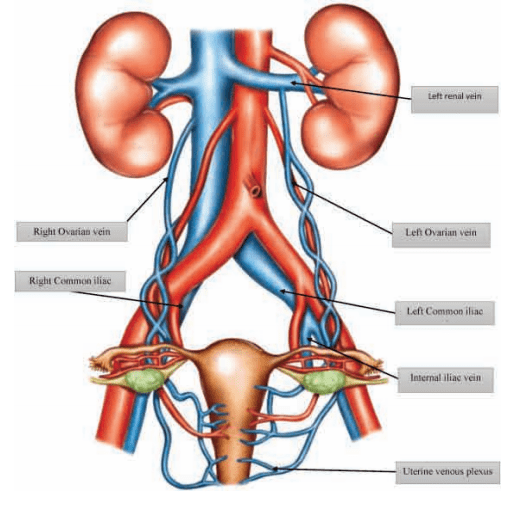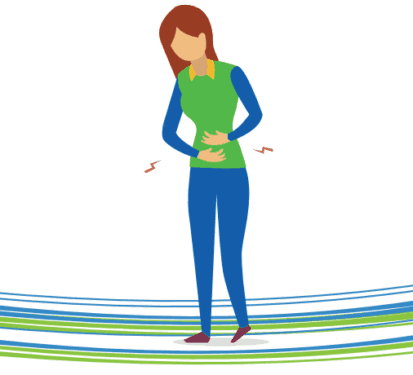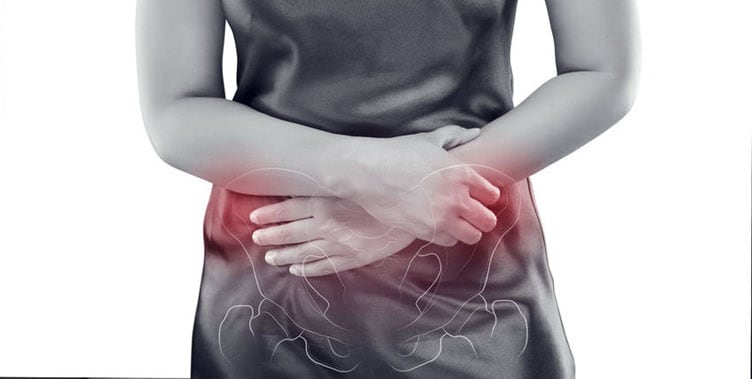Did you know that approximately 1/3 of all women will experience chronic pelvic pain in their lifetime and that their chronic pelvic pain could be caused by PCS? Chronic pain by definition lasts longer than six months and may worsen a woman’s menstrual cycle. Pelvic congestion syndrome (PCS) is one of the causes of chronic pelvic pain, a condition very common in women that can potentially lead to significant disability.
Pelvic Pain PCS
PELVIC PAIN MAY BE CAUSED BY PELVIC CONGESTION SYNDROME
WHAT IS PELVIC CONGESTION SYNDROME?
The causes of chronic pelvic pain are varied, but recent advancements show the pain may be due to pelvic varicose veins or compressed veins in the pelvic area. Pelvic congestion syndrome is a painful condition often caused by dilatation of the ovarian and/or pelvic veins or “blockage” of the upper iliac vein (see diagram), closest to the pelvic area.

It is estimated that up to 15% of women between the ages of 20 to 50 have pelvic varicose veins. Many women with pelvic congestion syndrome spend years trying to get an answer as to why they have this chronic pelvic pain. Similar to the cause of varicose veins in the legs, the valves in the pelvic veins become weakened or damaged, struggling to bring blood back to the heart. In time, the blood is allowed to flow backwards and pool within the pelvis area, causing them to bulge with increased pressure, which can cause additional pain and
affect the uterus or ovaries.
WHAT ARE THE SYMPTOMS OF PCS?
Pelvic congestion syndrome (PCS) must be considered if the pelvic pain worsens when sitting or standing and is relieved with lying down. For women who experience chronic pelvic pain, pelvic congestion syndrome is often missed as a diagnosis. This is due to the fact that women lie down for their pelvic exams, relieving the pressure and decompressing the vein. Studies have shown up to 30% of patients with chronic pelvic pain have pelvic congestion syndrome as a component of their pain.
Common pelvic congestion syndrome symptoms include:
- Dull or aching pain in the pelvis or lower back that worsens throughout the day while standing
- Increased pain during or following intercourse, menstrual periods, or pregnancy
- Irritable bladder that sometimes leads to stress incontinence
- Irritable bowel (recurrent abdominal pain and diarrhea alternating with periods of constipation)
- Vaginal discharge
- Varicose veins of the lower abdomen, thigh, or buttocks
- Abdominal bloating, mood swings, depression, and fatigue.
WHAT ARE THE RISK FACTORS FOR PCS?
Most women with pelvic congestion syndrome are younger than age 45 and in their childbearing years. Certain factors can put a woman at higher risk for the condition, including:
- Multiple (2 or more) pregnancies
- Presence of a “tipped” (retroverted) uterus
- Fullness of the leg veins – especially upper thighs
- Polycystic ovaries
- Obesity
- Hormonal increases or dysfunction
- Estrogen can also weaken the vein walls, predisposing women to PCS.
HOW IS IT DIAGNOSED?
Prior to seeing a vascular specialist, it is recommended that all patients have a thorough gynecological evaluation in order to rule out other pelvic diagnoses. Pelvic congestion syndrome can be diagnosed through several minimally invasive methods such as ultrasound, MRI, pelvic venography or an intravascular ultrasound.
HOW IS PCS TREATED?
There are several treatment options for Pelvic Congestion Syndrome. Hormonal medications, prescribed by your gynecologist, may reduce blood flow and congestion of the varicose veins. If these are ineffective, then minimally invasive therapies may be considered such as non-surgical treatments of the damaged vein or “unblocking” the vein with an endovascular procedure. These procedures are performed in one of our Maryland Vascular Specialists Outpatient Centers and are safe and effective ways to treat Pelvic Congestion Syndrome.
If you believe you have PCS and are interested in learning whether you are a candidate for treatment, contact one of our Maryland Vascular Specialists offices to set up a consultation or referral.




